General News
Arizona police hunt for serial killer linked to seven deaths
Police in the US state of Arizona say a single suspect may be responsible for a series of shootings that have left seven people dead.
The first attacks were reported in March when two men were shot while walking outside; both survived.
The last incident was reported on 12 June when three women were shot and killed outside a home in west Phoenix.
All of the shootings occurred at night, and the victims appear to have been targeted at random.
A witness to one of the shootings helped detectives develop a sketch of the suspect.
Police described the suspect as a white or Hispanic man between 20 and 30 years old. He may have an accomplice, police said.
"Someone out there knows who did this," Phoenix Police Chief Joseph Yahner said. "We need our community to help us solve these cases."
Source: bbc.com
- Read more
-
13/Jul/2016
Zimbabwe pastor Evan Mawarire calls for more protests
A Zimbabwean pastor who was briefly detained after organising a nationwide strike last week has called on people to keep protesting.
Evan Mawarire told the BBC people should stay at home as part of a campaign against corruption, economic mismanagement and unemployment.
He said the campaign was serious about wanting change.
Mr Mawarire was freed on Wednesday when a court in Harare dismissed a legal case against him.
His lawyers successfully argued that the charge of subversion had been added at the last minute, denying him a fair trial.
The pastor has been at the heart of a social media campaign denouncing the government's management of the economy.
He said the #ThisFlag movement's goal was to "get as many citizens as possible involved in nation-building".
His latest call for people to stay away from work in protest at the economic crisis went largely unheeded, with most businesses opening as normal on Wednesday.
Mr Mawarire admitted the protest was not as successful as last week's - when the country's cities were deserted - but said the strike should continue on Thursday.
He said: "Let's all shut down and send a message to our government that enough is enough, we need changes in very simple things, in very simple areas.
"And our protest - non-violent, non-inciting, stay-at-home, is the best because it is within the confines of the law.
"Every Zimbabwean who does not participate is robbing us of a great opportunity to add to the momentum of where our country is going."
Source: bbc.com
- Read more
-
13/Jul/2016
Islamic State confirms key commander Omar Shishani dead
A news agency linked to so-called Islamic State has confirmed the death of key leader Omar Shishani, who the US said it killed in March.
The Amaq news agency said Shishani was killed in combat in the town of Shirqat, south of Mosul in Iraq.
The Pentagon said in March he had died from injuries sustained in a US air strike in north-eastern Syria.
Shishani's real name was Tarkhan Batirashvili but he was also known as Omar the Chechen.
The red-bearded jihadist was said to be a close military adviser to Islamic State leader Abu Bakr al-Baghdadi.
The confirmation came on the Amaq website, which IS regularly uses to issue news and which had denied the Pentagon's claims in March.
Amaq said he died trying to repel forces campaigning to retake the city of Mosul.
It did not specify when, but the statement conflicts with the US claims made in March.
It said its strike on 4 March had taken place near the north-eastern town of Shaddadi, where Shishani had reportedly been sent to bolster local IS forces.
Last year, the US offered a $5m (£3.5m) reward for Shishani.
It said he had held numerous senior military positions within the group, including "minister of war".
Source: bbc.com
- Read more
-
13/Jul/2016
US sentences Chinese hacker for stealing military information
A Chinese businessman who pleaded guilty to hacking sensitive military information has been sentenced to nearly four years in prison in the US.
Su Bin admitted collaborating with hackers in the Chinese military to steal data from US defence companies between 2008 and 2014.
He was arrested in Canada in 2014 and extradited to the US.
The Chinese government has repeatedly denied any involvement in hacking foreign companies or governments.
In addition to the 46-month prison sentence, the Los Angeles court also ordered Su to pay a $10,000 (£7,600) fine.
"Su Bin's sentence is a just punishment for his admitted role in a conspiracy with hackers from the People's Liberation Army Air Force to illegally access and steal sensitive US military information," assistant attorney general John Carlin said in a statement.
"Su assisted the Chinese military hackers in their efforts to illegally access and steal designs for cutting-edge military aircraft that are indispensable to our national defence," he explained.
Financial gain
Mr Su pleaded guilty to one count of conspiring to gain unauthorised access to a protected computer and to violate the Arms Export Control Act.
He said he helped the hackers for personal financial gain, admitting he passed on information to Chinese hackers about which persons, companies and technologies to target.
He also pleaded guilty to translating the stolen material into Chinese.
The hack had targeted information on transport planes and fighter jets that was then offered for sale to Chinese companies.
China and the US have regularly swapped accusations about who is behind the cyber-attacks they each suffer.
In 2015, China arrested a group of hackers after the US government supplied them with a list of cybercrime suspects, accused of having stolen research and development information.
Source: bbc.com
- Read more
-
13/Jul/2016
Theresa May to hand out more jobs in first cabinet
New Prime Minister Theresa May will continue to form her new government later - as she begins her first full day in Downing Street.
Leading Brexit campaigner Boris Johnson said he was "humbled" having been named new foreign secretary, in one of Mrs May's first cabinet appointments.
Philip Hammond became chancellor, Amber Rudd is home secretary, and Eurosceptic David Davis is new Brexit secretary.
Mrs May later told European leaders she was committed to the UK leaving the EU.
- New cabinet: Who's in, who's out?
- May vows to be 'one nation' prime minister
- Laura Kuenssberg: May gets on with job
- Profile: Who is Theresa May?
- In pictures: UK gets new leader
In a series of congratulatory phone calls taken by Mrs May on Wednesday evening, the UK's second female prime minister spoke to German Chancellor Angela Merkel, French President Francois Hollande and Irish Taoiseach Enda Kenny.
A Downing Street spokesman said Mrs May had "emphasised her commitment to delivering the will of the British people to leave the European Union".
"The prime minister explained that we would need some time to prepare for these negotiations and spoke of her hope that these could be conducted in a constructive and positive spirit," the spokesman added.
Mrs May will continue to fill out her new cabinet later on Thursday, with the new secretaries of state for health, education, and work and pensions among those expected to be appointed.
Mrs May began forming her new cabinet shortly after her arrival into 10 Downing Street.
Her first cabinet announcement was former foreign secretary Mr Hammond as chancellor - replacing George Osborne.
Mr Osborne had been fired because his "brand" was seen as "too tarnished", BBC political editor Laura Kuenssberg said.
Mrs May also appointed Liam Fox to the new position of secretary of state for international trade, while Michael Fallon was retained as defence secretary.
By Laura Kuenssberg, BBC political editor
Whenever she happens to be near a microphone, Theresa May tends to say - absolutely truthfully it appears - that she just wants to "get on with the job".
Well she certainly has done that, wasting no time in announcing the most senior jobs in her cabinet, the first appointment only an hour or so after she walked in.
No surprise on appointment one - Philip Hammond, the former foreign secretary, becomes the money man. He's the embodiment of the phrase, "a safe pair of hands", and takes on the biggest role as Mrs May's supporter.
The biggest surprise is the appointment of Boris Johnson, the Tory members' darling, as the foreign secretary - one of the greatest offices of state, with a hugely different role as the UK contemplates life outside the EU.
Speaking on Wednesday night, Mr Johnson said he was "very humbled" and "very proud" at the appointment.
"Clearly now we have a massive opportunity in this country to make a great success of our relationship with Europe and with the world and I'm very excited to be asked to play a part in that," he told the BBC.
However, Liberal Democrat leader Tim Farron predicted Mr Johnson would "spend more time apologising to nations he's offended" than working as foreign secretary.
After visiting Buckingham Palace, where she was formally appointed as prime minister by the Queen, Mrs May made her first speech outside 10 Downing Street.
She vowed to lead a government that worked for all, not just the "privileged few", promising to give people who were "just managing" and "working around the clock" more control over their lives.
For an "ordinary working class family", she added, "life is much harder than many people in Westminster realise".
She highlighted the "precious bond" between England, Scotland, Wales and Northern Ireland and between "every one of us".
Mrs May also paid tribute to her predecessor, David Cameron, saying he had been "a great modern prime minister".
Mr Cameron had earlier given his final speech as prime minister outside Number 10, saying the job had been "the greatest honour" of his life and that the UK was "much stronger" than when he took over.
He took part in his final Prime Minister's Questions in the House of Commons, where he was given a standing ovation by Conservative MPs, before formally tendering his resignation to the Queen.
Source: bbc.com
- Read more
-
13/Jul/2016
Brexit: Tensions emerge over UK-EU trade negotiations
UK and EU politicians have given very different accounts of how the UK's Brexit negotiations should proceed.
The EU's Trade Commissioner, Cecilia Malmstrom, says the UK cannot begin negotiating trade terms with the bloc until after it has left.
"First you exit then you negotiate," she told BBC Newsnight.
But the BBC understands other EU Commission officials privately believe it is "inconceivable" that trade talks would not start before the UK's exit.
One of the candidates to be next UK prime minister, Liam Fox, called Ms Malmstrom's stance "bizarre and stupid", saying the Brexit talks would include trade.
But the BBC's Chris Morris in Brussels says Ms Malmstrom's view of two consecutive sets of negotiations appears technically correct.
'Divorce' proceedings
At the EU summit this week the 27 government leaders - without the UK - agreed Brexit "divorce" talks should begin and end before any talks on a new settlement for the UK, Chris Morris says.
Brussels sources told our correspondent there was a real determination among the leaders not to mix the two.
The statement from the 27 said they wanted the UK to be "a close partner of the EU". But they also spoke of an agreement to be "concluded with the UK as a third country".
The phrase "third country" means the UK post-Brexit.
Outside the EU, the UK would trade with the bloc under World Trade Organization rules, pending a possible new deal on free trade.
WTO conditions would mean trade tariffs and non-tariff barriers, as the UK would no longer be in the EU single market.
When do Brexit talks start?
Not until a new Conservative leader is elected, who will replace David Cameron as prime minister by October.
Then it will be up to the new leader to decide when to trigger the EU's Article 50, the procedure for withdrawing from the EU.
Article 50 sets a two-year deadline for withdrawal from the EU. But the detailed negotiations on the UK's future relations with the EU could last years longer.
What sort of deal does the UK want?
Much depends on who wins the Conservative leadership. There are also divisions in the Leave camp over which of the UK's current EU arrangements should be kept.
Immigration was such a key issue in the referendum there is likely to be hard bargaining over free movement of EU workers.
But EU leaders have said access to the single market requires the free movement of people.
Achieving continued preferential access to the EU single market of 500m consumers would be a big prize for the UK. But there are also voices in the Leave camp urging a UK focus on trade with other partners.
Could there be free trade without free movement?
Who will negotiate with the UK?
Once the UK has given notification under Article 50, the European Council - that is, the other 27 governments and council president - will adopt guidelines for the negotiations.
It is not yet clear how the EU will organise its negotiating team, but the European Commission will take charge of the details.
The final deals on UK withdrawal and a future UK-EU relationship will have to be agreed by the EU's top institutions - the European Council, Commission and European Parliament.
Source: bbc.com
- Read more
-
01/Jul/2016
Gunmen take hostages in Bangladeshi capital Dhaka
Gunmen have stormed a popular cafe in the diplomatic area of the Bangladeshi capital, Dhaka, taking a number of hostages, officials say.
Several foreigners are among those being held by eight or nine armed men in the city's Gulshan district, they add.
Two police officers have been killed about 30 others injured in a gun battle, a spokesman said.
So-called Islamic State has said it carried out the attack.
A statement on the group's self-styled news agency Amaq said militants had attacked a restaurant "frequented by foreigners." It said that more than 20 people "of different nationalities" had been killed, but this has not been confirmed.
Security forces say they are trying to negotiate the hostages' release.
Initial reports said that as many as 20 foreigners were among those taken captives.
"We want to resolve this peacefully. We are trying to talk to the attackers," said Benazir Ahmed, chief of the Rapid Action Battalion, Bangladesh's elite police force.
"Our first priority is to save the lives of the people trapped inside."
Police said the gunmen burst into the Holey Artisan Bakery Cafe at about 21:20 (13:20 GMT) and opened fire.
The cafe is described as being popular with expatriates, diplomats, and middle-class families.
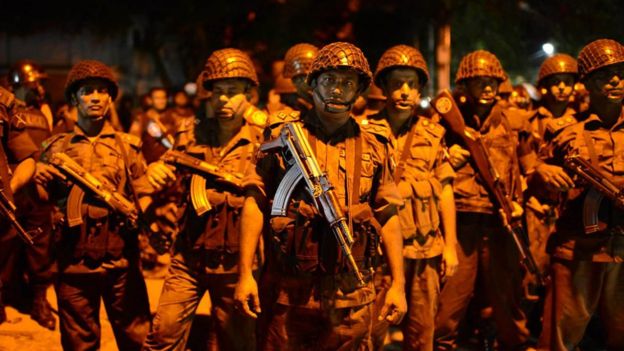
Police and officers of Bangladesh's Rapid Action Battalion are at the scene
Media reports quoted witnesses as saying that "Allahu Akbar," meaning "God is greatest," was heard as the attack took place.
An eyewitness said she heard a loud noise, followed by continuous gunfire.
"The glass of my drawing room shattered," Rashila Rahim said.
"My auntie, her daughter, and two friends went there for Iftar (breaking of the Ramadan fasting), and they have not come back. We cannot even check where they are."
Another local resident, Tarique Mir, said he could hear sporadic gunfire nearly three hours after the attack began.
"It is chaos out there. The streets are blocked. There are dozens of police commandos," he said.
BBC South Asia editor Jill McGivering says that although high-profile gun attacks are rare in Bangladesh, the latest incident follows a series of murders widely blamed on Islamist extremists.
Source: bbc.com
- Read more
-
01/Jul/2016
North Korea test-fires missiles in defiance of UN sanctions
North Korea has test-fired two mid-range ballistic missiles from its eastern coast, says South Korea.
The first launch was considered to have failed, travelling about 150km (90 miles) before landing in the sea.
The second, launched hours later, flew about 400km. Military officials in the South said both were intermediate-range Musudan missiles.
A confirmed successful test would mark a step forward for North Korea after four failed launches in recent months.
South Korea's Joint Chiefs of Staff said Seoul and the US were "carrying out an in-depth analysis" of the second launch, and did not say whether it was considered a success.
North Korea, which is developing nuclear weapons, is banned by UN resolutions from any use of ballistic missile technology.
- North Korea's missile programme
- Is South Korea equipped to defend itself?
- A world leader in dramatic rhetoric
- How potent are the threats?
South Korea's presidential office announced that it would hold a national security meeting to discuss the launch.
Analysis: Stephen Evans, BBC News, Seoul
North Korea has tested these medium range missiles six times now in three months. Outside experts and intelligence agencies believe the first five launches were certainly failures, but aren't sure about the sixth (today's second launch).
It seems to have gone about 400km (250 miles), far short of its maximum range. That may be because it failed or it may be because a decision was taken not to send it over Japan which had said it would shoot any missile down.
So why is North Korea conducting tests so frequently?
Some Western scientists say that the more conventional way of testing is to conduct the test, and if it fails, to go away and work out why before trying again some months or even a year later.
If this steady method over a long period isn't being followed by North Korea, it may be because of intense pressure from the top, a pressure the scientists on the ground will no doubt feel.
'Provocative actions'
The US State Department has strongly condemned the launches, with spokesman John Kirby saying the tests would only increase efforts to stop North Korea's weapons programme.
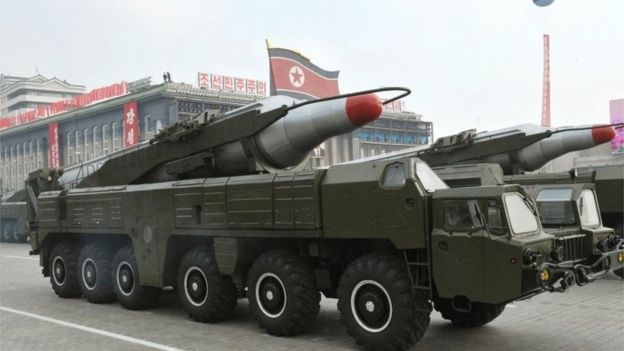
North Korea has yet to conduct a full flight test of a Musudan missile
"We intend to raise our concerns at the UN to bolster international resolve in holding [North Korea] accountable for these provocative actions," said Mr Kirby in a statement.
North American Defense Command (Norad), which tracked the missiles, determined they did not pose a threat to North American territories.
Japanese Prime Minister Shinzo Abe has said such tests "clearly cannot be tolerated".
The Musudan is believed to have a range of about 3,000km (1,800 miles), enough for it to hit South Korea, Japan and the US territory of Guam in the Western Pacific.
North Korea is thought to have dozens of them but has never successfully tested one.
The four other missiles tested in the last two months either exploded mid-air or crashed.
Surrounding countries had detected preparations for a launch in the past few days and warned that it was about to happen.
The Musudan missile
- The Musudan, also known as the Nodong-B or the Taepodong-X is an intermediate-range ballistic missile.
- Estimates differ dramatically on its range, with Israeli intelligence putting it at 2,500km and the US Missile Defense Agency estimating about 3,200km. Other sources put its upper limit at 4,000km.
- The lower range of the Musudan will enable it to hit the whole of South Korea and Japan. At its upper range it would be able to target US military bases on Guam.
- Its payload is unknown, but is estimated at 1.0-1.25 tonnes, according to AFP news agency.
Source: bbc.com
- Read more
-
21/Jun/2016
Trump says US should consider profiling against crime
The presumptive Republican candidate in the US presidential election, Donald Trump, has suggested the country should consider using profiling to combat crime.
Mr Trump made the remarks when asked if he supported more profiling of Muslims in the US, in the context of last week's shooting at an Orlando gay club.
Profiling uses ethnicity, race and religion to determine whether a person has or is likely to commit crimes.
Critics say it could alienate Muslims.
In an interview with CBS, Mr Trump said other countries had "successfully" adopted the measure.
"I hate the concept of profiling but we have to start using common sense," he said.
"I think profiling is something that we're going to have to start thinking about as a country... It's not the worst thing to do."
'Orlando justifies my Muslim ban' says Trump
21 things that Donald Trump believes
Mr Trump has stepped up his rhetoric since a gunman, New York-born Omar Mateen, killed 49 people at a night club in Orlando, in the worst mass shooting in recent US history.
The attacker claimed allegiance to so-called Islamic State as he carried out the massacre, but US officials believe he was "self-radicalized".
In the wake of the attack, Mr Trump called for a ban to people from all countries with a history of terrorism against the US.
He had previously expressed support for a temporary ban on foreign Muslims entering the country.
Orlando shooting: Special report
In the interview, the Republican also repeated a call for the Muslim community to report suspicious activities and reiterated his support for more scrutiny of mosques.
He said this could resemble a controversial surveillance programme in New York City that was shut down following lawsuits and complaints.
His proposals have been heavily criticised by some fellow Republicans and also by political opponents and campaigners.
In a separate interview, Attorney General Loretta Lynch said such measures could backfire by severing contacts with the Muslim community.
"It's very important for us to maintain our contacts within the Muslim community," she said in an interview on CNN.
"Because, often, individuals, if they're from that community and they're being radicalised, their friends and family members will see it first. They will see activity first. And we want that information to come to us."
Source: bbc.com
- Read more
-
20/Jun/2016
UN says refugee numbers at record level
The number of people displaced by conflict is at the highest level ever recorded, the UN refugee agency says.
It estimates that 65.3m people were either refugees, asylum seekers or internally displaced at the end of 2015, an increase of 5m in a year.
This represents one in every 113 people on the planet, it adds.
Meanwhile, the UN refugee chief says a worrying "climate of xenophobia" has taken hold in Europe as it struggles to cope with the migrant crisis.
The influx of people, the biggest since World War Two, has led to greater support to far-right groups and controversial anti-immigration policies.
In its annual report marking World Refugee Day, the UN said it was the first time ever that the number of refugees worldwide passed the 60m mark.
Over half of all of them came from war-torn Syria, Afghanistan and Somalia, it added.
Migrant crises through history
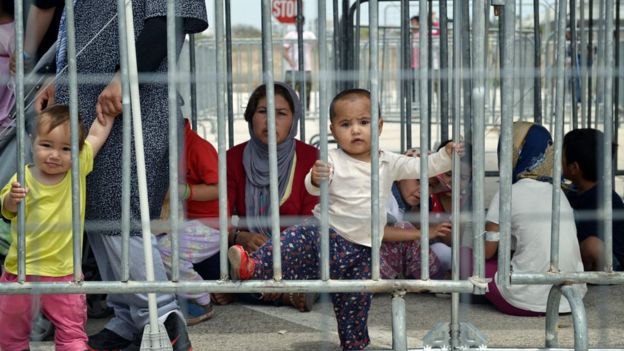
Europe has introduced a number of measures to curb the influx of migrants and refugees
Despite the huge focus on Europe's migrant crisis, the UN said 86% of the refugees were being sheltered in low and middle-income countries.
It pointed out that Germany received the most asylum requests, reflecting what was described as the country's readiness to accept refugees.
More than 1,011,700 migrants arrived in Europe by sea last year, according to the International Organization for Migration (IOM), although other agencies put that number much higher.
Some 35,000 arrived by land, the IOM said.
The preferred destination for most of them were richer northern countries like Germany and Sweden.
'Climate of xenophobia'
The crisis has caused significant political rifts within the EU, with some states inside the border-free Schengen area putting up fences and reimposing frontier controls.
The European bloc reached an agreement with Turkey in an attempt to stem the flux, a deal that has been heavily criticised by human rights groups.
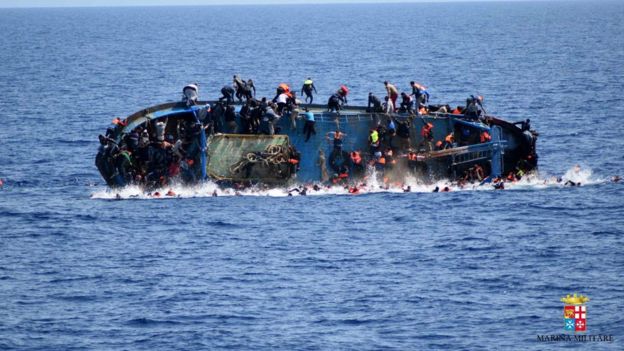
Thousands of people continue to make dangerous journeys in trying to reach Europe
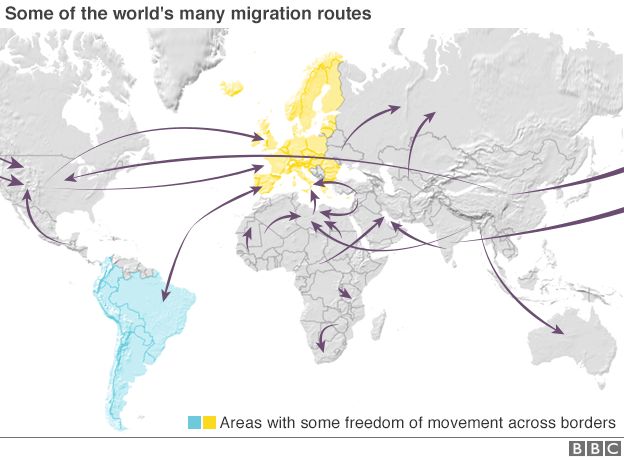
Source: bbc.com
- Read more
-
20/Jun/2016
Health: Obesity boom 'fuelling rise in malnutrition'
Malnutrition is sweeping the world, fuelled by obesity as well as starvation, new research has suggested.
The 2016 Global Nutrition Report said 44% of countries were now experiencing "very serious levels" of both under-nutrition and obesity.
It means one in three people suffers from malnutrition in some form, according to the study of 129 countries.
Being malnourished is "the new normal", the report's authors said.
Malnutrition has traditionally been associated with children who are starving, have stunted growth and are prone to infection.
These are still major problems, but progress has been made in this area.
The report's authors instead highlighted the "staggering global challenge" posed by rising obesity.
The increase is happening in every region of the world and in nearly every country, they said.
Hundreds of millions of people are malnourished because they are overweight, as well as having too much sugar, salt or cholesterol in their blood, the report said.
'Totally unacceptable'
Professor Corinna Hawkes, who co-chaired the research, said the study was "redefining what the world thinks of as being malnourished".
"Malnutrition literally means bad nutrition - that's anyone who isn't adequately nourished.
"You have outcomes like you are too thin, you're not growing fast enough… or it could mean that you're overweight or you have high blood sugar, which leads to diabetes," she said.
While many countries are on course to meet targets to reduce stunted growth and the number of underweight children, very few are making progress on tackling obesity and associated illnesses such as heart disease.
In fact, the report says, the number of children under five who are overweight is fast approaching the number who are underweight.
Co-chairman Lawrence Haddad said: "We now live in a world where being malnourished is the new normal.
"It is a world that we must all claim as totally unacceptable."
The report calls for more money and political commitment to address the problem. It says for every $1 (70p) spent on proven nutrition programmes, $16 (£11.25) worth of benefits ensue.
Source: bbc.com
- Read more
-
14/Jun/2016
French police chief's killer 'claimed allegiance to IS'
A man claiming allegiance to so-called Islamic State (IS) stabbed a French policeman to death before being killed when police stormed a house, in what officials say was a "terrorist act".
The attacker took the officer's partner and their son hostage in their home in Magnanville, near Paris. Officers of an elite police unit stormed the house in Magnanville.
The partner was found dead but the child was rescued.
French media say the attacker had been sentenced in 2013 for involvement with jihadist groups with links to Pakistan.
Unnamed sources identified him as 25-year-old Larossi Abballa, who lived in nearby Mantes-La-Jolie and was convicted for "criminal association with the aim of preparing terrorist acts".
He was sentenced to a three-year term, with six months suspended, they said.
Islamic State's Amaq news agency said an IS "fighter" carried out the attack.
If that is confirmed, it would be the first militant attack in France since a state of emergency was imposed following last November's attacks which left 130 dead in Paris.
And it happens as the country is in high alert as it hosts the Euro football championship, which started on Friday.
French prosecutors launched an anti-terror investigation, AFP news agency reported.
'Abject act of terrorism'
French Interior Minister, Bernard Cazeneuve, said the attack was an "abject act of terrorism".
He spoke as a cabinet meeting was being held by President Francois Hollande.
Man attacked policeman before entering house and taking a woman and child hostage, witnesses said.
In a statement earlier, Mr Holland called it an "abominable drama."
Witnesses quoted by AFP said that the knife-wielding man may have shouted "Allahu akbar" (God is greater) when he attacked the 42-year-old policeman, who was not in uniform, outside his home.
The attacker then went inside the house and took a woman and child hostage.
He is reported to have claimed allegiance to IS while talking to police negotiators.
Interior ministry spokesman Pierre-Henry Brandet said France's elite police Raid unit was brought in after the officer's killer took hostages at around 21:00 (19:00 GMT).
He said negotiations had been unsuccessful and a decision had been made to "launch an assault" at about midnight.
Witnesses reported hearing loud explosions as the officers from the Raid unit moved in.
"The toll is a heavy one," Mr Brandet later told reporters at the scene.
"This commander, this police officer was killed by the individual... (and) we discovered the body of a woman. The assailant, the criminal was killed. Thankfully, a little boy was saved. He is safe and sound."
A source later told AFP: "The anti-terror department of the Paris prosecution service is taking into account at this stage the mode of operation, the target and the comments made during negotiations with the Raid."
The victims have not yet been named. Magnanville is about 55 km (35 miles) north-west of the French capital.
Source: bbc.com
- Read more
-
14/Jun/2016
Orlando shooting: Vigils held around world to honour victims
Vigils have been held in Orlando, Florida, and around the world for the victims of Sunday's deadly gun attack on a gay nightclub.
A Muslim cleric told those attending the Orlando event that Muslims stood united with them against "the ideology of hatred, death and destruction".
Similar gatherings have been held in countries including France, Australia, the UK and Germany.
The attack on Orlando's Pulse nightclub left 49 people dead and dozens wounded.
US authorities say gunman Omar Mateen pledged allegiance to so-called Islamic State (IS) shortly before the attack.
Several Pulse customers have told US media that Mateen was a regular visitor to the nightclub.
"Sometimes he would go over in the corner and sit and drink by himself, and other times he would get so drunk he was loud and belligerent," Ty Smith told the Orlando Sentinel.
Other witnesses said they recognised him from gay dating apps.
President Barack Obama is due to travel to Orlando on Thursday to pay his respects to the victims.
US gun companies see share price rise
Orlando shooting: Special report
Thousands of people gathered in central Orlando on Monday night, holding candles and flowers in tribute to the victims.
Imam Muhammad Musri, of the Islamic Society of Central Florida, said the attack had been "an act of terror, an act of hate".
"We condemn the ideology of hate and death and destruction and we call for all Muslim leaders and communities across this nation and across the world to stand up and to deal with this cancer and to remove it once and for all," he said.
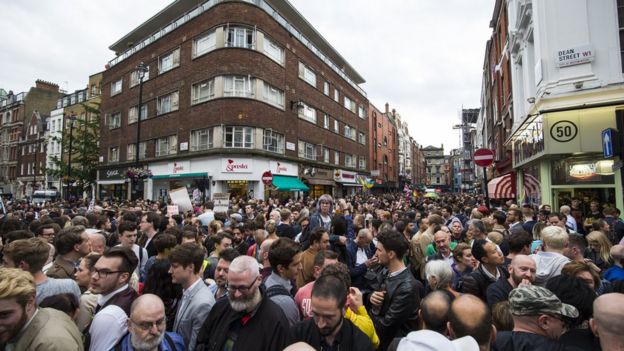
The vigil in London brought crowds on to the streets of Soho
The vigil was held outside the area's main performing arts venue, the Dr Phillips Center, which has become the site of a makeshift memorial.
"Pulse gave me confidence, made me realise I was normal and so much like everyone else," said Cathleen Daus, a former employee at the club who attended the vigil.
In New York, the lights of the Empire State Building were turned off as thousands attended a memorial event for the Orlando victims.
A vigil was also held in London's Soho district, the hub of the city's gay community, and there were cheers as 49 balloons were released, one for each of those who died.
Australia's landmark Sydney Harbour Bridge was lit in the rainbow colours of the gay community flag as hundreds gathered to pay tribute.
"This could have happened anywhere," Paul Savage told AFP news agency at the candlelit vigil.
Paris's Eiffel Tower was also lit up in rainbow colours, as well as the colours of the US flag, as people held a memorial to honour those killed and injured in Orlando.
In Berlin, more than 100 people gathered outside the US embassy to light candles, lay flowers and wave rainbow flags.
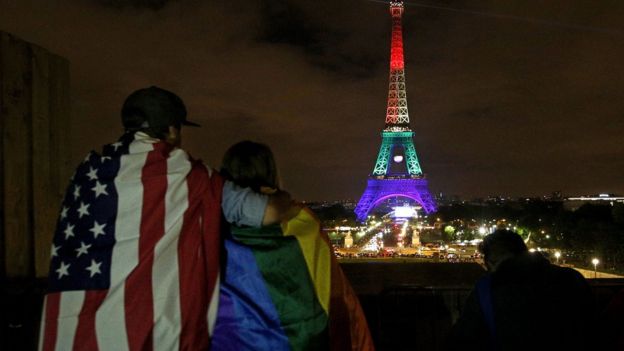
The Eiffel Tower was lit up in tribute to the Orlando victims
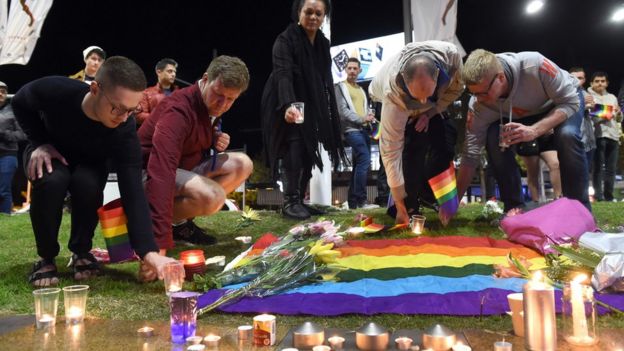
Flags and candles formed a makeshift memorial in Sydney, Australia
The deadliest mass shooting in recent US history ended when police shot Mateen dead. The attack also left 53 people injured, five of them in a serious condition.
On Monday, President Obama said the inquiry was being treated as a terrorist investigation.
However, he said there was no clear evidence that Omar Mateen was directed by IS.
FBI Director James Comey said there were "strong indications of radicalisation and of potential inspiration by foreign terrorist organisations".
"We're highly confident this killer was radicalised at least in some part through the internet," he said.
The two presumptive candidates running for US president spoke about what they would do to stop similar attacks.
Republican Donald Trump said changes were needed to the US immigration system which he blamed for allowing Omar Mateen's family to come to the US from Afghanistan.
Democrat Hillary Clinton called for action to stop militants getting hold of assault rifles, saying weapons of war had no place on America's streets.
What happened on the night?
Mateen began shooting inside the club around 02:00 (06:00 GMT) on Sunday, when the club was holding a Latin night and was packed with revellers.
An off-duty police officer working at the club fought Mateen in a gun battle before police reinforcements arrived.
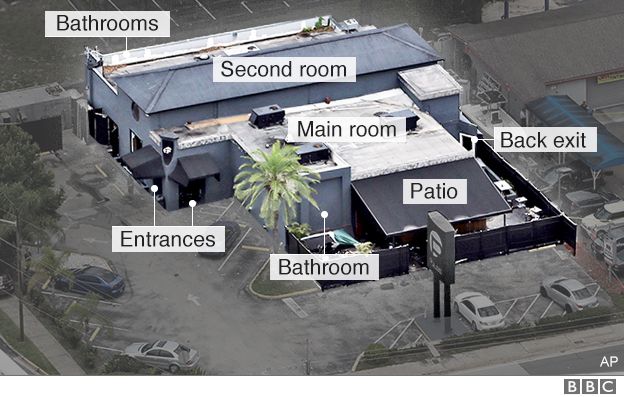
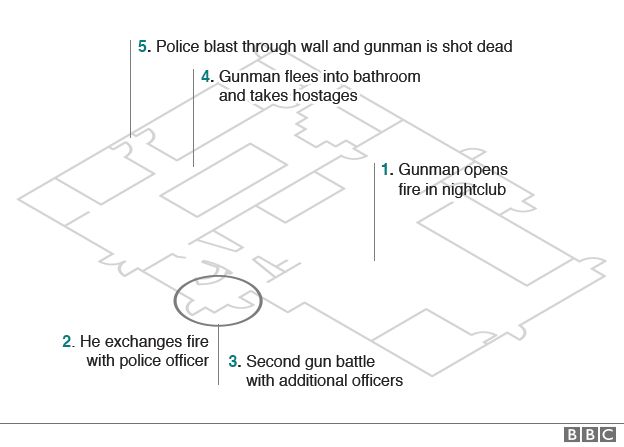
Forced to retreat into a toilet, Mateen took hostages, Orlando police chief John Mina said.
Another 15 or so people were in another toilet, across the hallway, Orlando Mayor Buddy Dyer said.
Believing Mateen would kill again imminently, police used explosives and an armoured vehicle to break through a wall of the building and survivors began streaming through the hole they had created.
Mateen himself followed them out shooting and was killed, police say.
Cities around the world have been flying rainbow gay pride flags and illuminating buildings in solidarity with the victims of the shooting in Florida.
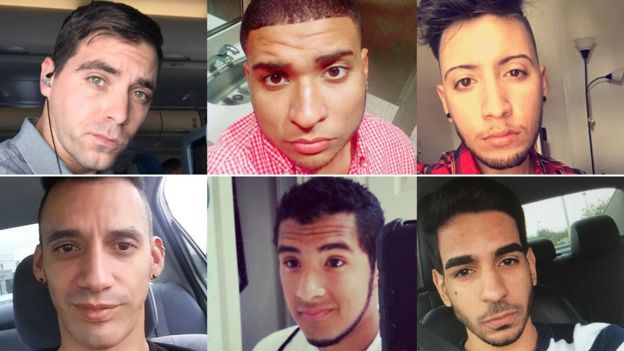
Clockwise from top left: Orlando shooting victims Edward Sotomayor, Stanley Almodovar, Luis Omar Ocasio-Ocampo, Juan Ramon Guerrero, Luis Vielma and Eric Ivan Ortiz-Rivera
The names of 48 of the 49 victims have now been released: 41 men and seven women. They include:
- Edward Sotomayor, 34, who worked for a company that organised gay cruises
- Stanley Almodovar, 23, a pharmacy technician who was remembered as "kind and sassy"
- Kimberly Morris, 37, who had only recently moved to Orlando and worked at Pulse as a bouncer
- Luis Vielma, 22, who worked at the Harry Potter section at Universal Studios - author J K Rowling paid tribute to him online
- Eddie Justice, 30, who sent his mother a series of text messages while inside the club - read more on him here
- Akyra Murray, 18, who graduated from high school a week ago - her school described her as a "superstar"
The Pulse nightclub was holding its Latino night when the attack took place and many of the victims have Latino or Hispanic names.
Read more about the victims here
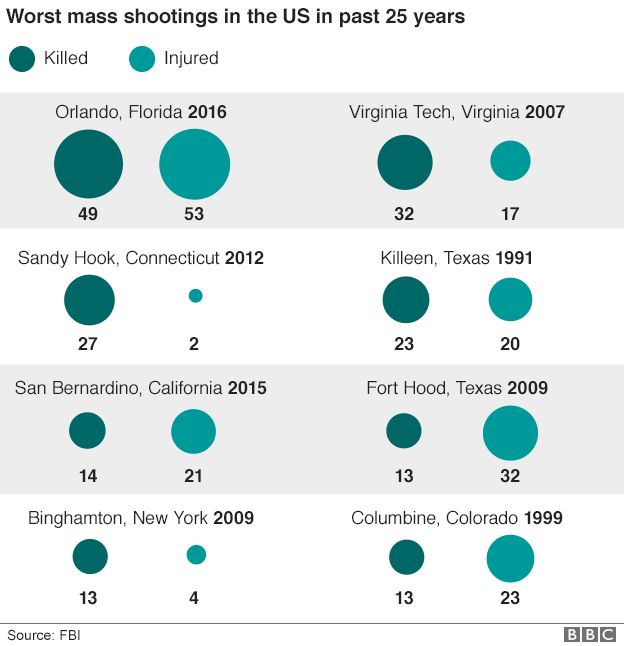
Source: bbc.com
- Read more
-
14/Jun/2016
Dutch woman arrested in Qatar after making rape claim
A Dutch woman is being detained in Qatar on suspicion of adultery after she told police she had been raped.
The 22-year-old, who was on holiday, was drugged in a Doha hotel and woke up in an unfamiliar flat, where she realised she had been raped, her lawyer says.
She was arrested in March on suspicion of having sex outside of marriage. She is due to appear in court on Monday.
The alleged rapist is also being held, but says the sex had been consensual.
A Dutch foreign ministry spokeswoman said the woman, who she named as Laura, had been arrested but not yet been charged.
"We have provided assistance to her since the first day of detention. For the sake of the defendant's case we will not make further comments at this point," the Dutch embassy said in a statement.
'Great horror'
The woman had gone dancing at a hotel in Doha where alcohol was allowed, "but when she returned to the table after the first sip of her drink... she felt very unwell" and realised she had been drugged, her lawyer Brian Lokollo told Dutch broadcaster NOS-Radio1.
Her next memory was waking up in an unfamiliar apartment where she "realised to her great horror that she had been raped," Mr Lokollo added.
The woman may also be charged with an alcohol-related offence, news website Doha News reported.
It is an offence to drink alcohol or be drunk in public in Qatar, although alcohol is allowed at certain hotels and expatriates can obtain a permit for purchasing alcohol.
In 2013, a Norwegian woman in neighbouring United Arab Emirates was given a 16-month prison sentence for perjury, extramarital sex and drinking alcohol after she told police she had been raped.
She was later pardoned and allowed to return to Norway.
Source: bbc.com
- Read more
-
11/Jun/2016
EU referendum: Sir James Dyson says Britain better off out
Britain will gain more from leaving the EU than it will lose, billionaire entrepreneur Sir James Dyson has said.
The inventor said the idea that Britain could not trade successfully outside the EU was "absolute cobblers".
He said the single market did not work because exporters had to adapt products like his to cater for different languages and different types of plugs.
Britain Stronger In Europe said: "James Dyson wanted the UK to join the Euro. He was wrong then and he is wrong now."
Court battle
Speaking to the Daily Telegraph Sir James, who is best known for designing a bagless vacuum cleaner, said the UK "will create more wealth and more jobs by being outside the EU than we will within it".
"When the Remain campaign tells us no one will trade with us if we leave the EU, sorry, it's absolute cobblers. Our trade imbalance with Europe is running at £9bn a month and rising. If this trend continues, that is £100bn a year."
Sir James argued that if, after a vote to leave, the EU imposed a 10% tariff on UK goods, Britain would do the same on imported EU goods. He said that because Britain imported far more from the EU than it exported there, it would bring in an extra £10bn a year for the UK.
The entrepreneur, who is worth over £3bn, also criticised the EU's free movement for not allowing the talented staff he needed to work in the UK.
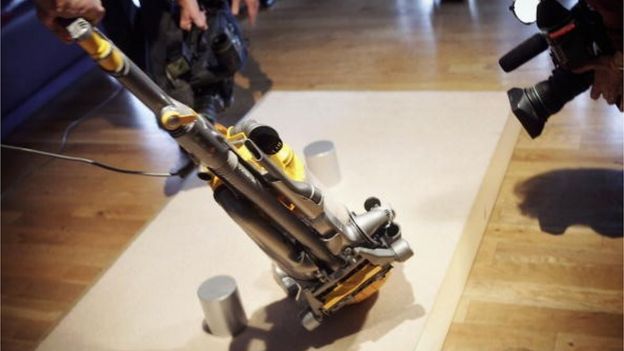
Sir James has been involved in several battles with the European Court against the EU's energy labelling policy
"We're not allowed to employ them, unless they're from the EU," he said. "At the moment, if we want to hire a foreign engineer, it takes four and a half months to go through the Home Office procedure. It's crazy.
"Why on earth would you chuck out researchers with that valuable technology which they then take back to China or Singapore and use it against us?"
Sir James has been involved in several battles with the European Court against the EU's labelling policy for vacuum cleaners.
"It's a politically motivated court of justice," he said. "Politically motivated to protect vested interests."
But Britain Stronger in Europe accused Sir James of "wanting to have his cake and eat it when it comes to the EU".
It highlighted that in 2000 Sir James had said Britain would be "suicidal" not to join the single currency and that in 2014 he had called for the free movement of people within the EU to be retained.
Sir James's announcement comes as a new poll suggests the Brexit camp has a 10-point lead. The latest online survey of 2,000 people on Wednesday and Thursday by ORB for the Independent put the scores at 55% to 45% in favour of pulling out, after allowing for an individual's likelihood to vote.
Vote Leave has tweeted that it does not believe the poll, adding it thinks the split is closer to 50-50.
In other developments:
- Jeremy Corbynwill make a fresh push to persuade Labour supporters to back keeping Britain in the EU. Amid questions over his commitment to the cause, he told Channel 4's The Last Leg that he was "not a huge fan" of the EU but was 70-75% in favour of staying
- A group of 13 Nobel prize-winning scientists have urged voters to back Remain saying leaving the EU was a "key risk" to the future of British science
- The Remain campaign has also been backed by some of Britain's largest developers and house builders who say a vote for Brexit will make the housing crisis worse
- Nigel Farage says he thinks the Leave campaign is on course for victory in the EU referendum with its "upbeat" message about life outside the EU
Source: bbc.com
- Read more
-
11/Jun/2016
How South African women are reclaiming the headscarf
African women have worn headscarves for many years for religious, cultural reasons and even as a fashion statement but they were traditionally worn by older, usually married women.
They are a common feature in ceremonies such as weddings and even funerals.
Many also love the convenience of it - it can be a quick fix for a bad hair day.
And young South African women are embracing the doek (as it is known in Afrikaans).
One of the most popular forms of headscarves across Africa is the gele from West Africa. It can be incredibly elaborate and is usually starched so the material becomes stiff to hold its shape.
In Nigerian how a Yoruba woman wears her headscarf can be a sign of her marital status - if worn with the ends facing down its means a woman is married and if worn with the ends up, she is single.
Here in South Africa, there is a necessary debate about the doek in the corporate world.
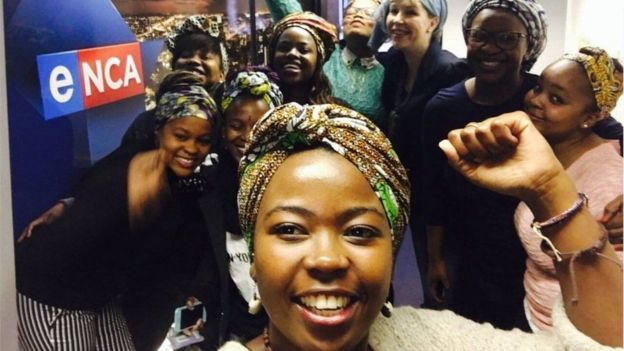
Reporters in the ENCA newsroom, showing their support for colleague Nontobeko Sibisi (F)
A news reporter for ENCA, an independent news channel trended on social media after it emerged that her story had been taken off air because she filmed it wearing a doek.
Cue social media storm.
The hashtags #RespekTheDoek and #DoekTheNewsroom trended for a number of days here last week with many people - including men and even women from all racial groups - wearing a doek to show their support for the young journalist.
The channel, while explaining that its dress code does not allow on-air journalists to wear headgear to work, has said it is now reviewing that policy.
But many believe the channel's reaction showed how the workplace has not changed with the times.
Some say it shows an intolerance to black culture.
"We are, after all, in South Africa where we have to be sensitive to everyone's culture and not just of those that don't wear doeks," says former entertainment writer Itumeleng Motuba.
"But don't forget that the workplace also insinuates that black natural hair is unprofessional. It seems looking African is unprofessional, which is rather ludicrous."
Kgothatso Maditse, a poet, agrees.
"It just goes to show just how far we are from accepting anything African if it doesn't have the 'right' stamp of approval. The longer we keep avoiding these topics, the longer we prolong and pacify an obviously stale way of thinking," she says.
'Good woman'
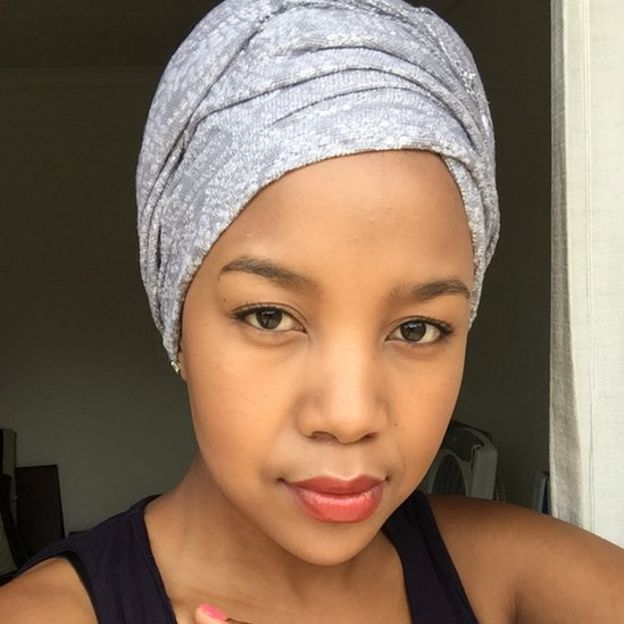
Wearing a headscarf, as a married woman, is a part of my Xhosa culture
In Xhosa culture, my culture, a married woman must wear iqhiya, which is what we call it, around her in-laws. This is seen as a sign of respect.
The in-laws will often show their makoti (daughter-in-law) how they'd like her to wear her scarf. In my case, mine needs to always cover my hair and ears.
My mother-in-law, who has been married for more than 40-years, wears it the same way.
For a while I had a love-hate relationship with the doek - it felt like a throwback to the past. It seemed like yet another way society was controlling how black women should look.
But a new generation of young women have now reclaimed the look - sporting a range of prints from all around Africa, they see the doek as an expression of what it is to be African.
And so I've grown to appreciate the delicate balance between ancient symbolism and modern identity - and made it my personal mission to celebrate its new-found power.
Kamogelo Seekoei, a Johannesburg writer, describes her headscarf as "a crown".
"Only a matriarch will know that a covered head means queen. We as black girls are out here celebrating our existence like never before," she says simply.
She says headscarves are a sign of "Queening" - a term used to refer to a social movement of black women from around the world who are embracing black beauty and power.
A selection of names for headscarves around Africa:
- South Africa - Doek
- Malawi/ Zimbabwe - Dhuku
- Ghana - Duku
- Nigeria - Gele
- Sudan - Tarha
- Sierra Leone - Enkeycha
- East Africa (Swahili) - Kilemba
- DR Congo (Lingala) - Kitambala
- Rwanda/ Burundi - Igitambara
- Uganda - Ekitambala (Luganda)/ Latam wich (Acholi)
- Zambia - Chitambala
From oppression to power
A number of high-profile African women are often pictured in elaborate headscarves, such as Liberian President Ellen Johnson-Sirleaf, African Union (AU) head Nkosazana Dlamini-Zuma and Winnie Madikizela-Mandela.
But the doek here is also rooted in racial politics.
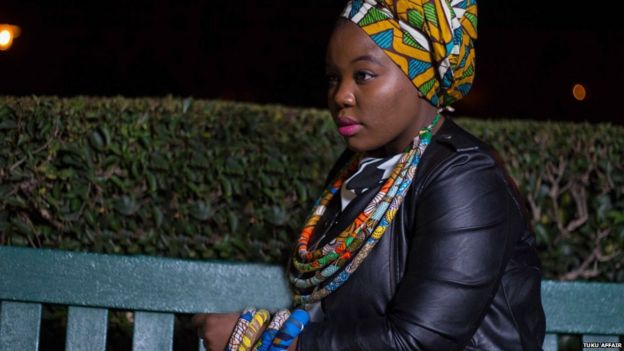
The doek has become a popular fashion accessory among young South Africans
In South Africa, black domestic workers have worn it as part of their cleaning uniform for decades and it has served as a not-so-subtle reminder of that person's social standing.
It is a way of exerting control - an outward symbol of the gulf between servant and master.
This perhaps explains my reservations about headscarves at first.
Some say it is beginning to shed that image.
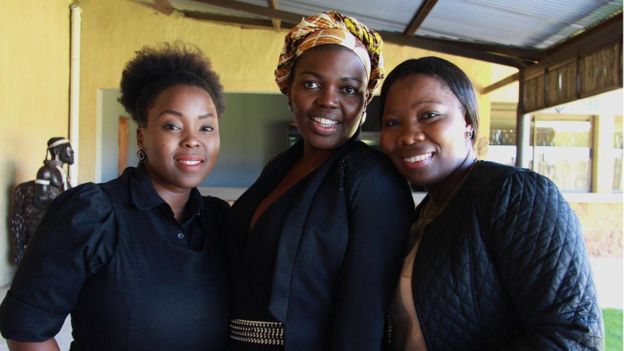
Kamogelo Seekoei (C) says wearing a headscarf is also about convinience
"Africans are going through a state of being woke [awakened]. Africans are coming back to themselves," says Tumi Ndaba, the owner of Tuku Affair, a Pretoria-based company that sells headscarves from materials bought all over Africa.
"The doek never left, it was just worn in a way that wasn't really appealing us, but the more we fall in love with ourselves, the more we work harder at perfecting and beautifying everything that belongs to us," she tells me.
South Africa, whose constitution is rooted in celebrating cultural diversity, is growing up and its people are now more than ever using their voice and asserting their identity.
And so on days when I wear a doek (which is admittedly sometimes on bad hair days), I feel regal.
Like many young people here, I now wear it as a statement, to celebrate Africa - with all its flaws and beauty and its journey to finding itself.
Read Pumza's article about the politics of African hair
Source: bbc.com
- Read more
-
11/Jun/2016
Award-winning Lagos lagoon school collapses
An award-winning floating school that provided classes to children on a lagoon in Nigeria's biggest city, Lagos, has collapsed during heavy rains.
It had been out of use since March and no-one was injured. The school had been in use for three years in Lagos' Makoko waterfront slum.
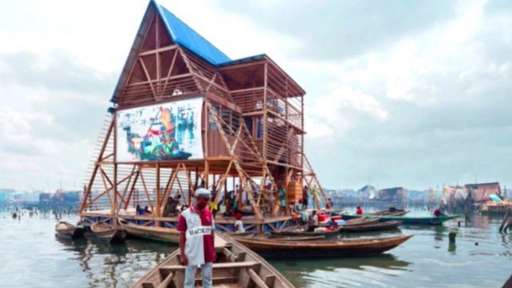
This was the three-storey floating school when it was in use
"The structure collapsed at around 10:00 on Tuesday following a rainstorm," the school's head teacher Noah Shemede, told the AFP news agency.
He said 58 students who had been taught there had been relocated to the main school nearby.
Architect Kunle Adeyemi said the building was a prototype which had been used "intensively" over the last three years and a new building would be constructed to replace it.
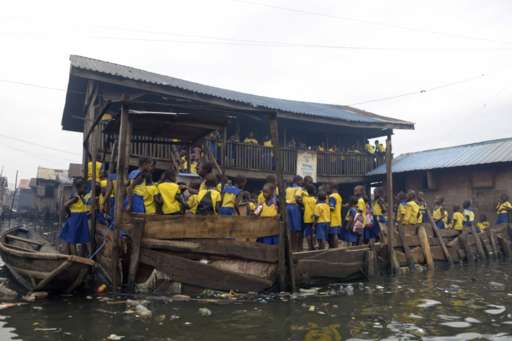
Makoko school children are going to a main school at the moment
Source: bbc.com
- Read more
-
09/Jun/2016
Ghana: Accra hit by more flood after heavy rain
Heavy downpours in Ghana's capital city Accra have caused widespread flooding today.
The city is still recovering from the deadly floods of June 2015 when around 100 people were killed when the petrol station that they were sheltering in following floods exploded.
Collins Pobee, from Modern Photos Ltd, used a drone to capture the extent of the flooding around Kwame Nkrumah Circle, where the deep flood water brought traffic to a halt.
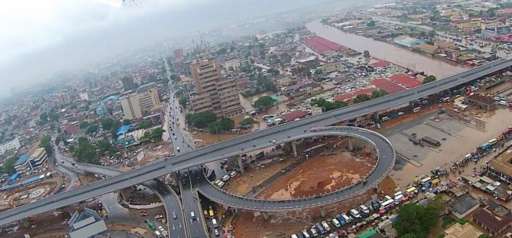
Deep flood water beneath the circle bridge area stopped traffic passing through
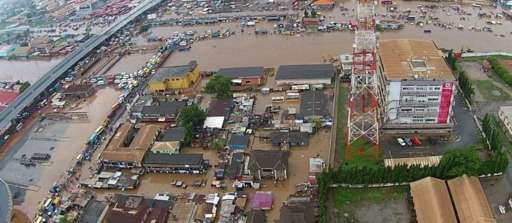
Shops and building were abandoned because of the rising flood waters
Source: bbc.com
- Read more
-
09/Jun/2016
Suspect extradited for people smuggling 'is wrong man'
Friends of a man extradited to Italy on Tuesday on people smuggling charges say police have the wrong man.
Prosecutors believe Mered Medhanie, known as The General, is at the heart of the operation to smuggle migrants from Africa to Europe.
An Eritrean man authorities say is Mr Mered was held in Sudan in May and flown to Rome on Tuesday.
But the man's friends told the BBC there had been a case of mistaken identity and he was innocent.
He was named by friends as Mered Tesfamariam.
A spokesman for Britain's National Crime Agency (NCA), that was involved in the operation, told the Press Association they were "liaising with our partners".
It added: "This is a complex multi-partner operation and it is too soon to speculate about these claims."
An Italian police official told the BBC that he was unaware of any investigation into the identity of the suspected smuggler. The BBC understands that the Italian police still believe they have the right person.
Has Eritrea's migration problem been exaggerated?
Europe's migrant story enters new phase
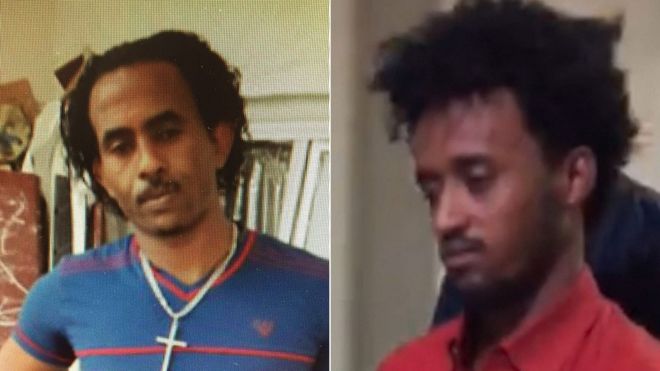
Left: An image of the man believed to be Mered Medhanie previously released by the UK National Crime Agency;
Right: the man said to be to be Mered Medhanie who was extradited to Italy
The NCA said it had tracked the suspect down to an address in Khartoum, where he was then arrested.
Images of him arriving in Rome were distributed by Italian police on Wednesday.
The BBC spoke to one man, Hermon Berhe, who lives in Ethiopia and said he grew up in Eritrea with the man shown in the pictures.
"I don't think he has any bone in his body which can involve such kind of things," he said. "He is a loving, friendly and kind person."
Another Eritrean man told the BBC's Will Ross he recently shared a house in Sudan with the man who was arrested.
Meron Estefanos, a Swedish-Eritrean journalist who interviewed Mr Mered last year, told Swedish media the man in the images was not him, but was instead a 28-year-old man with the same name.
"He's just a refugee who was in Khartoum, poor guy," she told Aftonbladet newspaper.
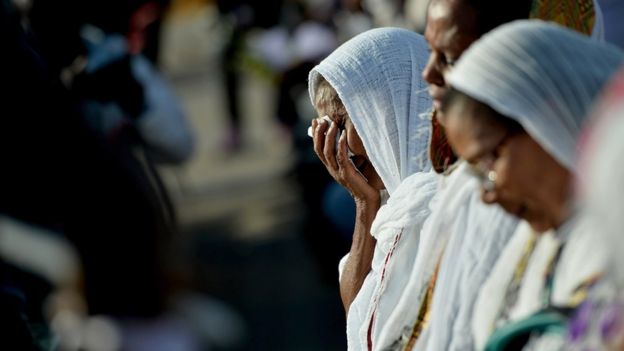
Mr Mered is believed to have planned a boat trip during which more than 350 migrants died
Italian news agency Ansa said Mr Mered was accused of being "the leader and organiser of one of the largest criminal groups operating between central Africa and Libya".
Prosecutors accuse Mr Mered of running the network alongside an Ethiopian accomplice, who is still at large.
The two men are accused of buying up kidnapped migrants from other gangs and sending those migrants on barely seaworthy ships across the Mediterranean towards Europe.
Known as "The General", as he styled himself on late Libyan leader Col Muammar Gaddafi, Mr Mered is also said to have driven around in a tank and boasted: "Nobody is stronger than me."
The NCA says Mr Mered is thought to have arranged the transit of a boat that sank near the Italian island of Lampedusa in October 2013.
At least 359 migrants died when the boat, travelling from Libya, capsized. Most were from Eritrea and Somalia.
Source: bbc.com
- Read more
-
09/Jun/2016
Papua New Guinea moves to block more student protests
The University of Papua New Guinea has obtained an injunction to stop protests after a number of people were hurt when a demonstration turned violent.
Police opened fire as students were trying to march from their campus in the capital, Port Moresby, towards parliament.
Police say 23 people were hurt.
The students want Prime Minister Peter O'Neill to stand down to answer corruption allegations, which he denies.
Mr O'Neill is also facing a possible no-confidence motion in parliament.
'Fight will continue'
On Thursday, protest leader Noel Anjo told Reuters news agency that the students' demonstrations would continue despite the ban.
"We're not going to give up," he said. "The students are not going to give up until and unless the prime minister resigns or surrenders himself to police and is arrested and charged. This fight will continue."
The court order also bans students from boycotting classes, which they have been doing for the past five weeks.
A statement by Mr O'Neill's office said an investigation was under way to determine to what extent the protests were "promoted by individuals outside the student body".
"The inquiry will also seek to uncover the source of external funding that has underwritten student protest in recent weeks," the statement said.
What are the students protesting about?
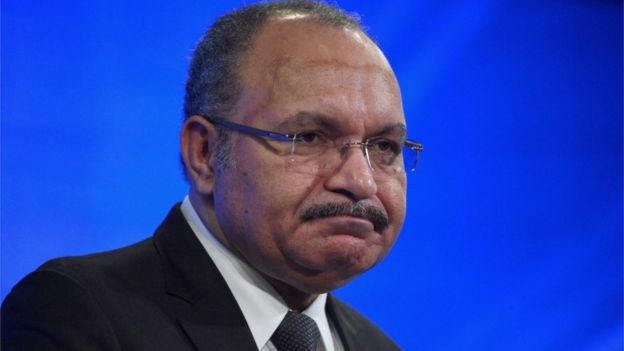
Mr O'Neill has rejected calls for his resignation
In 2014 a warrant was issued for Mr O'Neill's arrest, in an investigation into whether he authorised millions of dollars in illegal government payments to a large legal firm.
He has consistently evaded the warrant with court orders, and disbanded the anti-corruption watchdog.
Thousands of UNPG students have been boycotting classes for five weeks, demanding he resign. Classes were officially suspended last month.
What has Peter O'Neill said?
In May, Mr O'Neill responded to a petition from students saying that he would not be resigning.
He said the corruption allegations against him were of "questionable political intent", as reported by ABC.
Why is PNG so turbulent?
Papua New Guinea was ranked one of the most corrupt countries in the world in 2012 by Transparency International.
According to the World Bank, 70% of the country, the most linguistically diverse in the world, lives in poverty.
The country's higher education minister, Malakai Tabar, welcomed the injunction, Australia's ABC News reported.
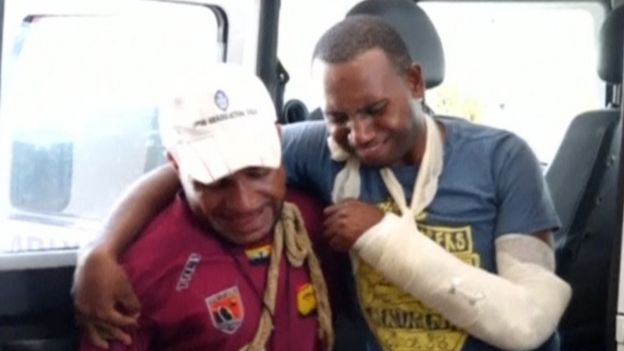
A number of people were reported injured during the clashes
"The overwhelming majority of students simply want to go to class, sit their exams and proceed to the next semester," he said, while blaming the violence on "thuggery".
Police commissioner Gari Baki said 23 students were injured, four seriously, local news site EMTV reported. He said an investigation would determine if they were shot.
A handful of police officers were also injured, he added.
Footage obtained by the BBC appeared to show a large crowd of students at the campus running away as shots and tear gas were fired.
Images circulating on social media also showed injured students being carried away.
Opposition MPs had told parliament on Wednesday that four people were killed, but the government and hospitals have denied there were any deaths.
Source: bbc.com
- Read more
-
09/Jun/2016
About Us
-
Archives
Recent posts
News for people who want to know
- Bakus Radio resource for |Ghana & Africa music |News |Entertainment |Sports | Copyright © 2016 . All Rights Reserved.
- Designed By Fresco Software Solution Pvt. Ltd.



























